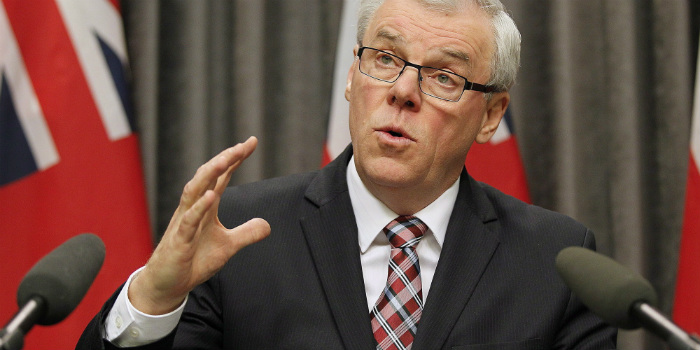It has been a month since five of Greg Selinger’s senior-most ministers resigned from his Cabinet in protest of his continued premiership. What has passed for leadership from Selinger since then has been paltry: the reek of desperation wafting from his offices at 450 Broadway and that of his party’s on Portage Avenue rival that of a rendering plant. A lingering, odious stench. Unlike the plant, however, which ultimately produces something of value, there is little doubt anything good can come from the current quagmire in which Selinger now finds himself sinking ever further.
In the latest turn in this sad saga—equal measures Kafkaesque and Shakespearean—the 25 members of the NDP provincial executive have determined there is nothing in law to compel the Premier’s resignation during the leadership contest he has called for himself. Whereas leadership aspirants were required to resign their ministerial posts to run in the contest to replace Gary Doer in 2009, it would now seem such a requirement was borne out of an agreement in principle, rather than any sort of legislative necessity. And so the NDP executive have concluded Selinger may continue in his role as Premier whilst at the same time vying for the role of, well, Premier.
Aside from this helpful legal clarification delivered on behalf of the NDP board by party president Ellen Olfert, little else about the contest has been shared. Indeed, the party has been woefully, arrogantly silent on the matter, leaving a slew of unanswered but important questions hanging in the air like the fetid smell of rendered pork offal.
What about current Ministers of the Crown? Will they be allowed to remain in Cabinet if they wish to contest the premiership, or will they be held to a different set of rules than the Premier himself? Either way, again, how can our Cabinet Government possibly be expected to function?
What about the Premier? Will he be allowed to campaign for the job (he already holds) during regular business hours? Will he be allowed to discuss his leadership campaign during Cabinet meetings, within caucus, around his own boardroom table?
What percentage of his day will be devoted to, say, governing and what percentage to campaigning? 80/20? 70/30? 50/50? At what point does doing one affect his ability to properly do the other?
Will those political aides working for him in his role as Premier be allowed to work for him in his role as candidate? Will they recuse themselves on an ad-hoc basis, or take a leave of absence every other business day? Or will it be mornings for the Premier, afternoons for the candidate? Perhaps he will have two sets of staff? But who will liaise between them, and what percentage of that person’s salary will be covered by the NDP?
[related_content slugs=”has-winnipeg-lost-its-bowmentum,the-ndps-leadership-crisis,decisions-were-made-a-case-for-autonomous-and-empowered-judicial-inquiries,the-shameful-end-of-greg-selingers-premiership” description=”More from Kris Ade” position=”right”]
More seriously, while no legal precedent exists to force the Premier from office during his bid for the job he already holds, does existing election financing legislation offer any sort of precedent or guidance when spelling out the rules that might govern his efforts to raise money to finance that bid? Given all those order-in-council appointments at his disposal, what sort of safeguards exist to ensure monies raised by his campaign will be secured transparently? Is it even possible for candidate Selinger to raise money without the appearance of quid pro quo?
So many questions, so few answers. And still the NDP seems to insist this matter does not concern Manitobans. To them, it is merely a party matter to be resolved by that party’s members. Nonsense.
Then again, why should Manitobans expect anything more from a Premier and a political party so desperate to retain their grip on power they have abandoned any sense of principle, honour or humility?
Make no mistake: Selinger’s detractors within the NDP are no better. Not a single member of the NDP caucus voted against the increase in the PST that the rebel cabal has since cited as a reason for their shocking display of disloyalty and disregard for the sacrosanct principle of cabinet solidarity. Furthermore, having already established they had lost confidence in the Premier and the government he leads when they unceremoniously resigned from his cabinet, they promptly voted with the Premier and that government on a motion of non-confidence tabled by the Leader of the Opposition.
Such are the actions of the shamelessly hypocritical, utterly consumed by hubris, motivated entirely by flagrant self-interest. The 2015 provincial election cannot come soon enough.
